The use of Urea Fertilizer for Beets is essential to supply the nitrogen required to stimulate plant growth, enhance yield, develop healthy roots, and increase the sugar content of the crop.
Using urea fertilizer at the right time, especially during the early growth stages of beets, can significantly improve their quality and productivity, thus boosting agricultural efficiency.
One of the best urea fertilizers available for sugar beets is 42% Liquid Shock Urea Fertilizer.
What Are the Benefits of Urea Fertilizer for Beets?

Most beet cultivation occurs in dry and semi-arid regions, where nitrogen levels in the soil are often low. Nitrogen plays a crucial role in achieving high yields in sugar beet farming.
Due to its high nitrogen content, low production costs, and compatibility with phosphorus and potassium, urea fertilizer is highly popular among beet farmers. Urea fertilizer offers several benefits for beets, including:
1. Providing Nitrogen
Urea is a rich source of nitrogen, essential for beet growth and development. Nitrogen is a key nutrient needed for synthesizing proteins, enzymes, and chlorophyll, which are crucial for overall sugar beet growth.
2. Enhancing Leaf and Stem Growth
Urea fertilizer promotes the growth of healthy leaves and stems in sugar beets, ultimately boosting photosynthesis and overall plant health.
3. Improving Beet Yield
Proper use of urea fertilizer can lead to higher beet yields. Nitrogen is especially vital during the early growth stages, promoting rapid growth and better establishment of the plant.
4. Increasing Sugar Content
Urea fertilizer enhances the sugar content of beets, resulting in higher sugar production.
In summary, urea fertilizer plays a significant role in supporting the optimal growth, development, and yield of sugar beets by providing essential nitrogen.
Introducing the Best Urea Fertilizer for Sugar Beets
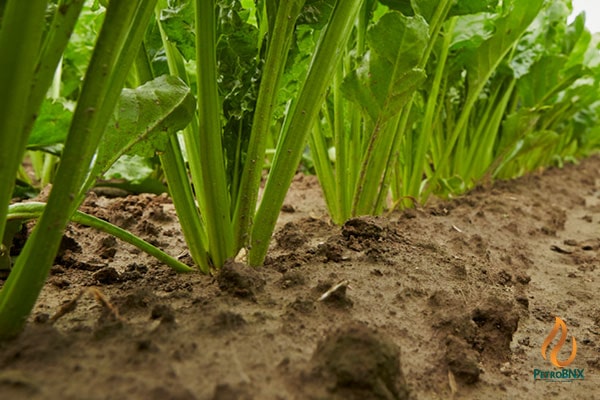
The best urea fertilizer for sugar beets is one with high nitrogen concentration and quality. When selecting urea fertilizer, consider the following:
- The fertilizer should be easily absorbed by plants and simple to apply.
- It should be free from impurities or contaminants that could harm the plant or soil.
- The best urea fertilizer should be formulated to release nitrogen gradually, supporting the plant’s sustained growth.
Factors like soil type, crop needs, and application methods should guide the selection of urea fertilizer to ensure optimal use and promote plant growth and fertility.
For your convenience, we recommend the following as the best urea fertilizer for sugar beets:
42% Liquid Shock Nitrogen Fertilizer
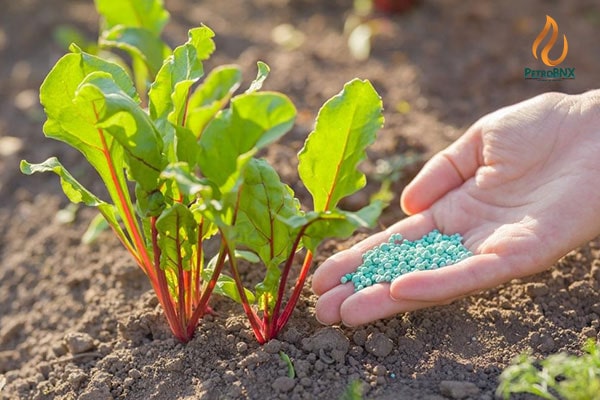
This high-nitrogen liquid fertilizer from the reputable Shock brand contains 42% nitrogen. It helps combat soil hardness, salinity, and poor quality in agricultural soils.
You can use 42% Liquid Shock Nitrogen Fertilizer for all crops, orchards, and greenhouse products through irrigation or foliar application.
Benefits of this American-made fertilizer include:
- Stimulating plant growth and providing essential nitrogen.
- Promoting root development and enhancing sugar content in crops like sugar beets.
- Quick absorption by plants due to its liquid form.
- Enriching soil fertility and regulating soil pH.
- Preventing leaf wilting caused by water stress.
To purchase this product, contact the number provided on the website and order it in 1, 5, or 20-liter packaging.
Signs of Nitrogen Deficiency in Sugar Beets
Sugar beet is highly sensitive to nitrogen deficiency, and its absence causes plant growth to halt, leaving the leaves thin and small. Signs of nitrogen deficiency in sugar beets include smaller and yellow leaves, elongated petioles, and reduced leaf blade size.
Due to nitrogen deficiency, the older leaves of sugar beet begin to yellow. If these symptoms are observed, it is recommended to use urea fertilizer (commonly known as white fertilizer) to meet the plant’s nitrogen requirements.
Timing for Urea Application in Sugar Beets
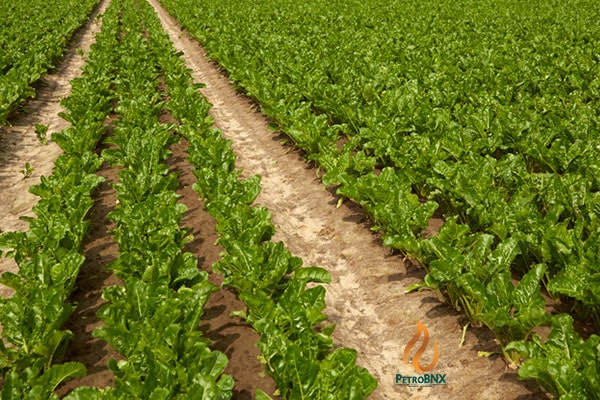
The frequency of urea application in sugar beets depends on factors such as planting date, climate, soil texture, organic matter content in the soil, and irrigation method.
If you have planted sugar beets in cold, rainy climates with light soil texture and low organic matter content, it is recommended to use urea fertilizer in two or three stages.
The best time for the initial application of urea in sugar beets is at the 4 to 6-leaf stage, approximately 45 days after planting and following thinning and weeding. Manage the urea application schedule to ensure that the last application is completed before the full canopy cover of the sugar beet plant.
Since sugar beet requires the highest nitrogen levels at the beginning of the growing season, the closer the urea application is to planting time or during the early growth stages, the more it enhances the quality and quantity of the sugar beet yield.
How to Apply Urea Fertilizer for Sugar Beets
Urea liquid fertilizer can be used through irrigation. In this method, the recommended amount of fertilizer is introduced into the sugar beet field along with irrigation water.
The urea fertilizer is absorbed by the plant’s roots and distributed to all its parts. For this purpose, we recommend reading the article “Best Irrigation Methods for Sugar Beets” to improve irrigation and fertilization efficiency.
Urea Dosage for Sugar Beets
The amount of urea fertilizer required for sugar beets depends on factors such as beet type, crop rotation history, organic matter content in the soil, expected yield, soil’s chemical and physical properties, agricultural management practices, and fertilization method.
For irrigation, you can use 5 to 10 liters of nitrogen fertilizer per hectare. However, this amount may vary based on soil deficiencies or planting density, up to 20 liters. It is advisable to consult experts at PetroBNX for precise recommendations.
Factors Affecting Sugar Beet Growth

When planting sugar beets, several factors should be considered to produce high-quality crops with high sugar content. These include:
- Using the best seeds suited to the local climate.
- Multiple plowing sessions to remove stones and prevent forked roots.
- Selecting the appropriate planting season to boost sugar content.
- Weed control for healthy growth.
- Optimal soil nutrition methods for superior sugar beet production.
Choosing the right fertilizer is essential, and it’s crucial to know which fertilizer to use, as overuse or improper application may reduce the plant’s sugar content or compromise the overall crop quality.
Increasing Greenness and Growth in Sugar Beet Fields

Excessive and unnecessary use of urea fertilizer, especially at the planting stage, can negatively impact seed germination. It can lead to leaching and loss of fertilizer, resulting in wasted resources and energy.
Purchasing Urea Fertilizer for Sugar Beets
You can easily order all the fertilizers needed for sugar beets, including humic acid fertilizers, complete fertilizers, NPK fertilizers, high-phosphorus fertilizers, and more, through the PetroBNX trading page.
Final Note
Based on the studies, it can be concluded that using urea fertilizer for sugar beets has numerous benefits, including improved plant growth and yield, stimulated growth, strengthened stems and leaves, increased sugar content, and healthy root development.
In summary, the optimal use of white fertilizer for sugar beets can enhance crop quality and yield, improving profitability and productivity for farmers.
FAQs
How can urea fertilizer be optimally used in sugar beet cultivation?
To optimize urea fertilizer use in sugar beets, it’s recommended to carefully calculate the amount and timing of fertilizer application. Uniform distribution of fertilizer in the field and combining it with other nutrients are also crucial. Proper irrigation methods and accurate timing in fertilization can significantly improve sugar beet yields.
Does using urea fertilizer for sugar beets harm the environment?
Proper and optimal use of urea fertilizer for sugar beets can enhance productivity without causing environmental harm.
What effects does urea fertilizer have on sugar beet growth and yield?
Urea fertilizer serves as a rich nitrogen source for sugar beets. Its use stimulates plant growth, increases yield, strengthens roots, and enhances the sugar content of the crop.


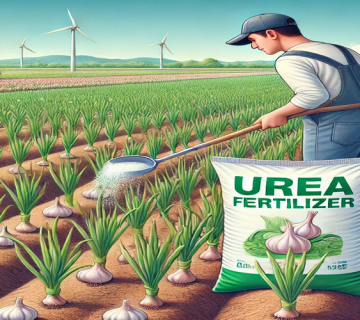
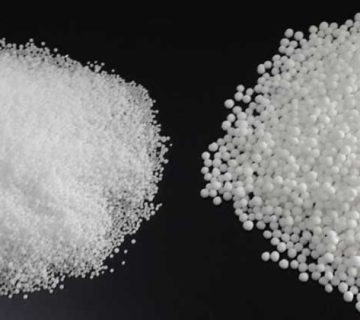

No comment